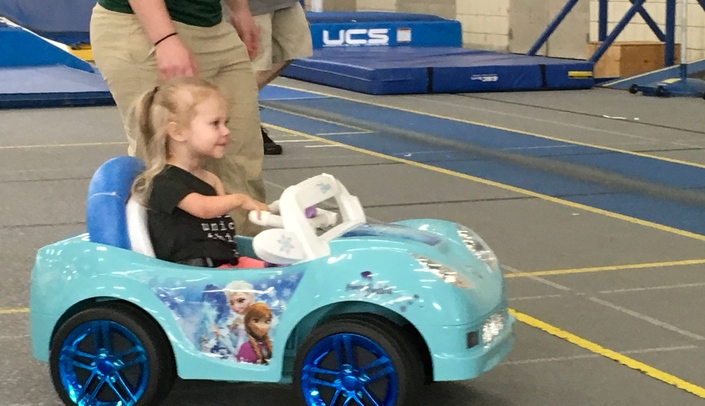Employees of Union Pacific, one of the nation’s leading transportation companies, will be teaming with therapists from the University of Nebraska Medical Center’s Munroe-Meyer Institute and students from area universities to provide a different type of transportation for young children who face mobility challenges due to intellectual and developmental disabilities.
The group will convert ride-on toy cars into affordable assistive mobility vehicles for 11 children. The project is part of GoBabyGo!, a national program that provides modified ride-on cars for kids with developmental disabilities. These cars will be provided at no cost to the families to promote early and independent mobility.
Mobility for children at that age is critical for development of social, cognitive and motor skills, but power wheelchairs are typically expensive, and children frequently outgrow them.
The event, with COVID-19 safety protocols, will be held at Union Pacific headquarters at 1400 Douglas St. in Omaha on Oct. 30, 8 a.m. to 1 p.m., with families arriving around 11 a.m.
"Union Pacific’s employees have been very interested and willing to contribute to the GoBabyGo! effort," said Sandy Willett, PhD, director of the MMI Department of Physical Therapy. "Union Pacific certainly is a company that understands the importance of mobility and the sense of freedom it provides, and their employees have been enthusiastic about this new collaboration. We greatly appreciate this new partnership."
MMI’s first GoBabyGo! build was in 2016. Since then, the institute has led events that provided more than 40 cars for children ages 9 months to 6 years.
"This is a wonderful program, and we are honored to be partnering with the Munroe-Meyer Institute to provide children more opportunities to move, socialize and explore the world. EASE, our employee resource group focused on disability awareness and inclusion, and our employees are looking forward to meeting and working with these children and their families," said Ashok Fichadia, assistant vice president-IT development for Union Pacific Railroad.
"Through actively moving, we learn so much more about our world than by passively looking at it," said UNMC physical therapist and organizer Joanie Bergeron. "We are pleased that UP is partnering with us to allow this to happen. It makes your day when you see a child able to move on their own for the first time. The smiles on everyone’s faces are priceless."
The event is made possible by a grant to the UNMC Munroe-Meyer Institute funded by a donation to the University of Nebraska Foundation. Occupational and physical therapy and engineering students from UNMC, the University of Nebraska at Omaha, the University of Nebraska-Lincoln, Nebraska Methodist College and Creighton University also are taking part in the event.
For more information on the GoBabyGo! Nebraska! program and major contributors, please check out the MMI website.
HIPAA NOTICE: Members of the media are asked to be aware that HIPAA regulations will be in effect at the event, and there will be some families who may not be interviewed, photographed or appear on video. MMI staff will be on hand to connect media with families who have signed waivers and are willing to appear on camera or speak to reporters.
ABOUT UNION PACIFIC
Union Pacific (NYSE: UNP) delivers the goods families and businesses use every day with safe, reliable and efficient service. Operating in 23 western states, the company connects its customers and communities to the global economy. Trains are the most environmentally responsible way to move freight, helping Union Pacific protect future generations. More information about Union Pacific is available at www.up.com.
ABOUT THE MUNROE-MEYER INSTITUTE
The mission of the Munroe-Meyer Institute is to be world leaders in transforming the lives of all individuals with disabilities and complex health care needs, their families and the community through outreach, engagement, premier educational programs, innovative research and extraordinary patient care.
